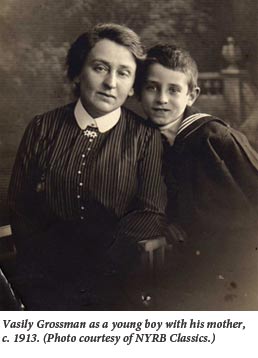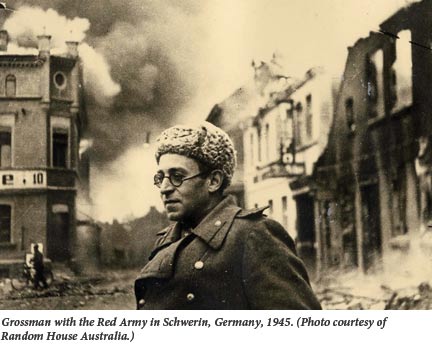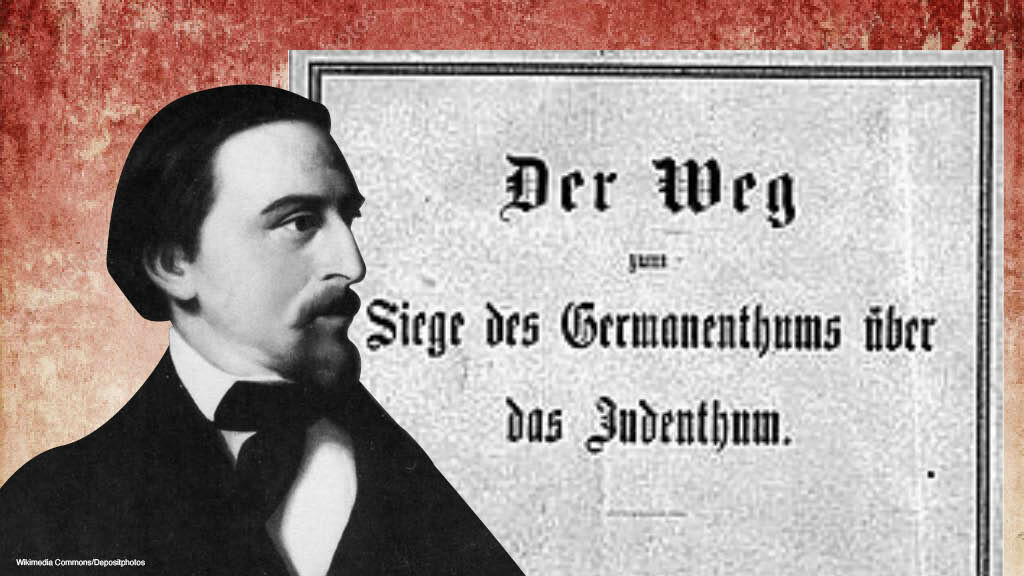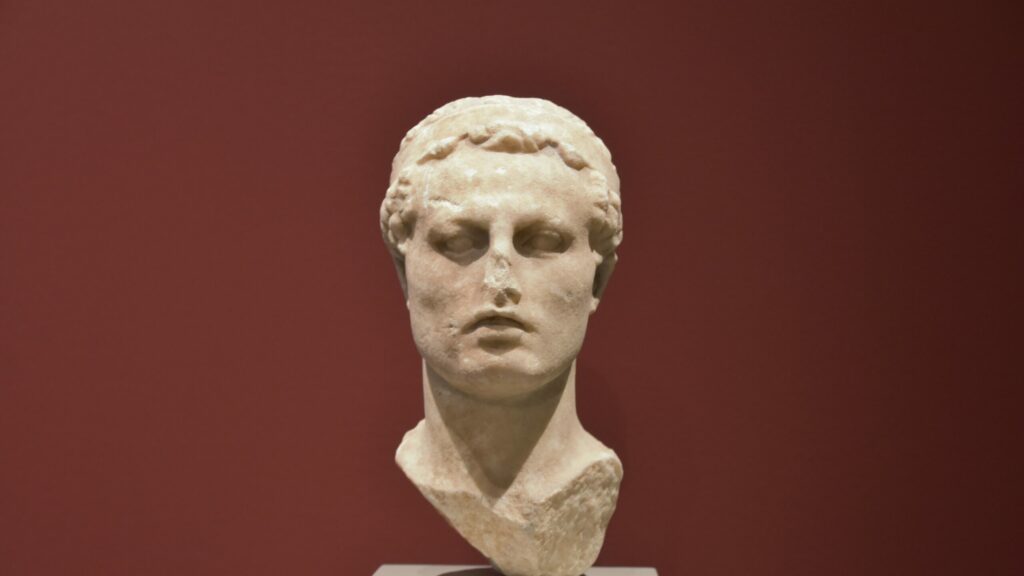Lucky Grossman
They say there are people who are born under a lucky star . . . But the star under which Grossman was born was a star of misfortune,” wrote Vasily Grossman’s colleague Ilya Ehrenburg. When Grossman died of stomach cancer in 1964, a month before the removal of Krushchev by Brezhnev, he had already been devastated by the efforts of the Soviet regime to delete him from history. He had pinned hopes on the Thaw, but in 1961 the KGB confiscated the manuscript of Life and Fate, his major novel indicting Stalinism and Hitlerism. “They strangled me in the back alley,” Grossman said to Boris Yampolsky. “They” included not only the regime and its active accomplices, but the silent majority of Grossman’s literary brethren.
Grossman had been one of the principal voices of anti-Nazi resistance, and a legendary journalist who spent 1000 days at the front during World War II. But his final years were difficult. Close friends still adored Grossman; Semyon Lipkin, who helped to smuggle the manuscript of Life and Fate to the West a decade after Grossman’s death, called him a “saint.” Grossman also enjoyed the dedication of his last love Yekaterina Zabolotskaya, widow of the great poet Nikolay Zabolotsky, though it is not clear that she ever fully understood him. (In Life and Fate, the Russian wife of Grossman’s fictional alter ego, Viktor Shtrum, loves him but fails to comprehend his Jewish anxieties.)
The Road, a new collection of Grossman’s shorter prose published by a team of translators and scholars under the loving curatorship of veteran translator Robert Chandler presents a retrospective of the writer’s career. The opening section offers a window into Grossman’s prewar years. Born Iosif Grossman in Berdichev, once known as the “Jerusalem of Volhynia,” he entered literature in 1929, the 2nd year of the first Five-Year Plan, with the Russian first name “Vasily.” In these early writings, including the story “In the Town of Berdichev,” one hears Grossman searching for a voice of his own. Isaac Babel and Andrey Platonov were among the early Soviet models, but as the story “A Young Woman and an Old Woman” demonstrates, Chekhov was Grossman’s beacon. But Grossman was also something of a revolutionary romantic. Although he never joined the Communist Party, it took him a long time to rid himself of the belief that Jews were beholden to the revolution.
The war against Nazism was a time of great personal trauma; his mother was murdered in Berdichev in September of 1941, along with 20,000 other Jews. But it was also Grossman’s time of glory—literary, civic, and military. Reporting from the trenches, Grossman survived the war physically unscathed, earning the moniker “lucky Grossman.” His novel The People Are Immortal grew out of the first months at war, and still reads breathlessly. Grossman’s articles in the main army newspaper, Red Star, were devoured by millions. Only a fraction of the material he gathered in interviews was published at the time. (If Grossman were alive today, he would have a blog.)

A section entitled “The War, the Shoah,” constitutes the core of the new collection. In reading Grossman’s wartime fiction and reportage, one senses his imperative to resist what by 1943 had become an unspoken Soviet directive: not to discuss specific Jewish victimhood and to downgrade Jewish military valor. A case in point is Grossman’s 1943 story “The Old Teacher,” which appears here in a new translation. Grossman was the first writer of fiction to present to the general Soviet reader an account of the Shoah by bullet. At the heart of the story lie the destinies of two professionals, the old teacher Rosenthal and the doctor Weintraub, as both face the impending execution of the town’s Jewish community. Grossman’s price for publishing about the Shoah was to obscure the collaboration of the local population with the Nazis. He did his best to hint at it by giving the traitors Ukrainian names. But the story’s prevalent sentiment is that cases of collaboration were singular, and that the Soviet people enjoyed unity and the local populations displayed empathy for the Jewish victims. The truth about the Shoah in the occupied territories was more complicated.
In the summer of 1944, Grossman saw the Aktion Reinhard camps in Poland. His searing essay on “The Hell of Treblinka” ran in the December issue of the Moscow magazine Banner. It read, and still reads, as though a Jewish Muse was speaking into his ear. The essay was reprinted as a pamphlet in 1945 and distributed at the Nuremberg Trials. From late 1943 to 1945, Grossman worked with Ilya Ehrenburg on The Black Book, a project of the Jewish Antifascist Committee. He wrote the preface, sections on “The Murder of Jews in Berdichev” and “Treblinka,” and prepared “The History of the Minsk Ghetto” along with other sections. His luck, such as it was, changed with the anticosmopolitan campaign and the derailing of The Black Book by Soviet authorities. He continued to publish and was spared the fate of the leaders of the Jewish Antifascist Committee, but he was vilified in the Soviet press. Stalin’s death in March 1953 eased his lot, but only temporarily.
Shimon Markish once said that no one wrote about the Shoah and Stalinist anti-Semitism “with as much poignancy and emotion” as Grossman. In his 1955 essay “The Sistine Madonna,” Grossman imagines Raphael’s Madonna as living through the crimes of both Nazism and Stalinism. He depicts the Madonna and child as Jews annihilated at Treblinka, as Ukrainians murdered in the Great Famine, and as Russians killed in the gulag. But, even here, Grossman can not shake Marxism-Leninism. The essay presents a class analysis, and includes sentences such as: “I believe that this Madonna is a purely atheistic expression of life and humanity, without divine participation,” and “The Madonna’s beauty is closely tied to earthly life. It is a democratic, human, and humane beauty.” Having grown up in the Brezhnevite years, I have a bit of a hard time reading such Soviet-speak, even from Grossman and even in translation.
Against the backdrop of Life and Fate (which Grossman still hoped to publish at home) and of Forever Flowing (which he did not), Part Three of Chandler’s new volume represents the intriguing final phase of Grossman’s career. It features six fictions completed between 1960 and 1962. Two animal stories, “The Dog” and “The Road,” form a pair not only for their subjects, but also because of the symmetry in the endings: The male protagonists behold the loving eyes of a dog and an elk, respectively. A shadow of Tolstoy’s art of the familiar made strange hangs over these late stories. “The Road,” the tale of a mule in the Italian army who finds himself in Russia, is compelling:
Through their warm breath and their weary eyes, Giu the mule and the mare from Vologda spoke clearly to each other of their life and fate, and there was something charming and wonderful about these trustful, affectionate beings standing beside each other on the wartime plain, under the gray winter sky.
The embedded reference to Life and Fate here signals that the strange mule furrowing the steppe with tired hooves is an allegory for Grossman himself, an overweight, bespectacled lieutenant-colonel walking with a cane through the carnage of history.
“In Kislovodsk” stands out among Grossman’s late fiction. Chandler is absolutely correct that among Grossman’s sources for this story were the materials prepared by Viktor Shklovsky for The Black Book. Set in 1942 in a resort in the foothills of the North Caucasus, this story reads as a commentary on “The Old Teacher,” and could have been titled “The Old Doctor.” Dr. Weintraub administers poison to himself and his family not long before the murder of all the Jews in his small town. The Russian doctor initially collaborates with the occupants and is placed in charge of a hospital for wounded Red Army soldiers. Complicity with the murder of his patients pushes the doctor and his wife over the edge:
They behaved very vulgarly . . . They ate pressed caviar and drank wine; he clinked with her and kissed her fingers as if they were young lovers in a restaurant . . . Then, in a harsh voice, she said, ‘And now poison me, like a mad dog—and yourself too!’
Cognates of the Russian word poshlost’, which Nabokov taught us is a special sort of banal and crass vapidness, punctuate the end of this story, and one wonders if Grossman is not warning us about vulgarizing the memory of the war and Shoah through fiction.
In his introduction and notes, Chandler identifies several overarching themes of Grossman’s late stories—and his whole career. One of them is the theme of failure, of being a neudachnik (loser), as Grossman called himself in Goodness Be to You!, a late non-fictional work that still awaits translation. Even more prominent is the theme of motherhood in his life and art. Grossman elevated the act of addressing a mother to the level of sacred music. The letters he wrote on the 9th and 20th anniversary of his mother’s death share an intimate connection with the fictional experience of Viktor Shtrum in Life and Fate, who loses his mother in the Shoah.

Grossman’s reception by Western readers is a story of great admiration tinged with occasional absurdities. The back cover of The Road quotes, in modified form, the last clause of a comment Martin Amis made in House of Meetings: “And by other ghosts-by Fyodor Dostoevsky, by Joseph Conrad, by Eugenia Ginzburg, and by the Tolstoy of the USSR, Vasily Grossman.” To call Grossman “the Tolstoy of the USSR” is misleading. There was, of course, literally a Tolstoy of the USSR, Count Aleksey N. Tolstoy, a writer whose stylistic gifts may have been more ample than Grossman’s, though he was also a venal Stalinist.
Reluctant to say anything irreverent about Grossman, Chandler has offered this disclaimer: “Only in one respect, perhaps, is Grossman overshadowed by [Leo] Tolstoy: he lacks Tolstoy’s ability to evoke the richness, the fullness of life . . . Grossman, however, is writing about one of the darkest periods of European history.” A dearth of desire and pleasure did help Grossman to capture the gruesomeness of history, but it was also an artistic problem in much of his fiction.
Grossman’s greatest works and pages are those where a gut-wrenching power of witnessing buttresses the force of moral indictment. “The Hell of Treblinka” remains his finest work. Many sections of Life and Fate are beyond critical praise, and the chapters describing the death of Sofia Levinton and young David in a gas chamber belong with the best pages of Holocaust literature. John and Carol Garrard, Grossman’s devoted biographers, called this “art from agony.”
But Grossman’s life was also agony from art—or an agony of art. This, oddly, brings one to the issue of translation. Another translator might take a more literalist strategy, and feel less inclined to downplay some of Grossman’s contortions of rhetoric. On the whole, Grossman gains and endures in translation, whereas a bicultural verbal genius like Isaac Babel inevitably loses in English translation, just as Bernard Malamud would lose in Russian translation. With the publication of The Road, Robert Chandler and his colleagues have given us new textual evidence to reflect on Iosif Grossman’s Jewish-Russian luck and on the literary immortality of Vasily Grossman.
Suggested Reading
Standing at Sinai in Medieval Germany
An unusual illustration of revelation from the fourteenth century Tripartite Mahzor.

An Old-New Bigotry? A Response
Both Jonathan Karp’s and Reviel Netz’s essays are written in the shadow of October 8—not the day of the unthinkably brutal Hamas massacre in southern Israel, but the day after.
Letters, Fall 2021
We and I; It's a Novel: An Exchange

Hanukkah’s Confounding Miracle
How Hanukkah became a holiday of many miracles and none.
Comments
You must log in to comment Log In